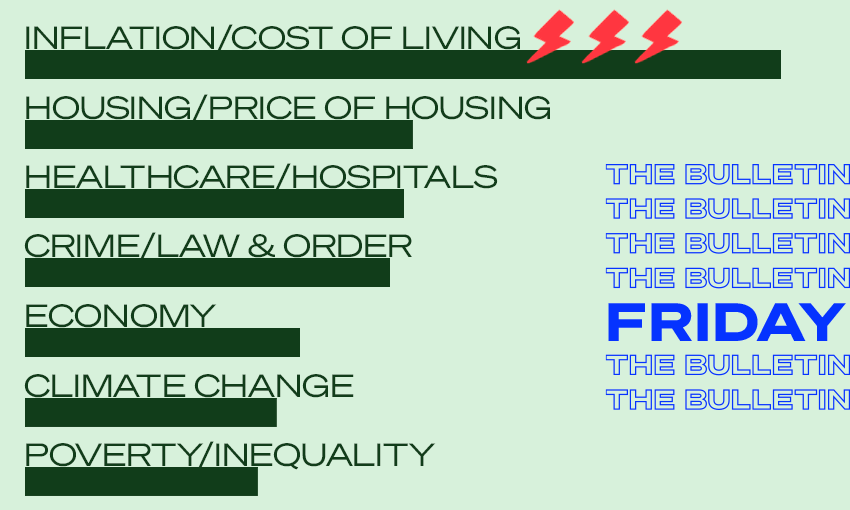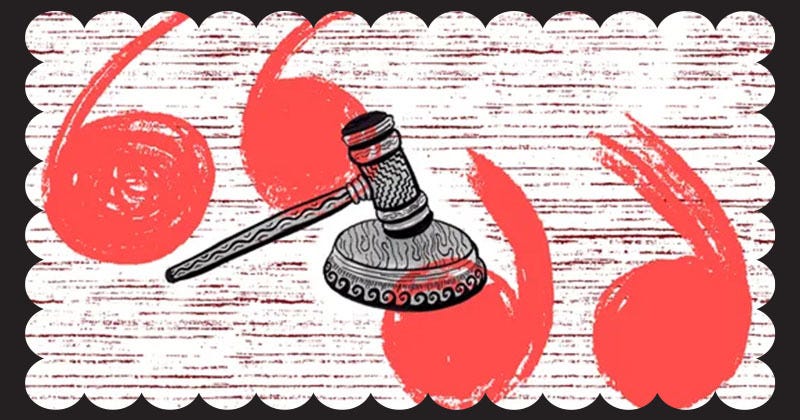The issue worrying New Zealanders the most
A new poll reveals which issues New Zealanders are most worried about and which political parties are best placed to deal with them.
Mōrena and welcome to The Bulletin for Friday, October 7, by Anna Rawhiti-Connell. Presented in partnership with Z Energy.
In today’s edition: community transmission of monkeypox; why we can’t plant our way out of our agri-emissions problem; Kiwirail to remain an SOE; but first, a new poll on what’s worrying us.
The latest Ipsos Issues Monitor has inflation/cost of living well ahead of everything else worrying New Zealanders (Image: Tina Tiller)
Cost of living tops list of concerns
It’s right there in the image and is probably the least surprising thing you’ve read this month but inflation/cost of living is the issue concerning New Zealanders the most. That's according to the latest Ipsos issues monitor which we’ve summarised here. Concerns about crime/law and order have increased from 19% in February this year to 31%. The Ipsos poll is not a party poll per se, but instead polls on issues and then which parties people believe are best equipped to handle them. It gives us early insight into the ground on which next year’s election might be fought. This morning Stuff’s Anna Whyte looks at the likelihood of increasing industrial action as the cost of living continues to bite.
Concern about cost of petrol falls but not for long
Concern about petrol prices have dropped 11% since May, because, well petrol prices have dropped. Yesterday the Organisation of the Petroleum Exporting Countries, more colloquially known as OPEC, said they would slash oil production by two million barrels per day. The AA says the move would have little impact on petrol prices in the short term, but has outlines why “serious pain at the pump” would arrive early next year.
National best placed to deal with four of top five issues
According to the poll, National is best placed to deal with cost of living, housing, crime/law and order and the economy. It’s the reverse in the UK right now following the mini-Budget announced by chancellor Kwasi Kwarteng. A YouGovt poll revealed Britons are much more likely to think that Labour would do a better job on the cost of living and delivering economic growth than the Conservative party. We started the week with everyone talking about the tax cut proposal in the UK and seem to have ended it talking about tax cuts in New Zealand.
Tax cut talk back on agenda
The tax cut talk here started on Monday with the prime minister leveraging the disaster in the UK to warn that National’s tax cut proposal would lead to more inflation and potentially British-style market chaos. The release of Crown accounts on Wednesday had National and Act renewing their calls for tax cuts after it was revealed that the government books were in better shape than expected. This morning Stuff’s Susan Edmunds looks at how much tax we pay and how that compares to other countries. The Herald’s Jenée Tibshraeny (apologies to Jenée for yesterday’s mangling of her surname) has a very good analysis (paywalled) of whether we can afford tax cuts.
A truly bicultural legal profession is possible, but it will take work
As Sir Tīmoti Kāretu says: “E mōhio ai koe ki ahau, e mōhio koe ki tōku ao - me mātua mohio ki taku reo” – In order to understand me and my world, you must know my language. Herewini Ammunson is a lawyer whose journey within te ao Māori has informed his views of the legal sector. He spoke at his graduation about the importance of tikanga and te reo Māori to the future of law in Aotearoa. “Whether tikanga in the law thrives, whether it struggles or whether it dies: that part is up to us. This is what it means to be a lawyer in Aotearoa in 2022.” Read his full speech on The Spinoff now, in partnership with Te Taura Whiri i Te Reo Māori.
Community transmission of monkeypox
Yesterday the Ministry of Health announced there have been two new cases of monkeypox that can not be linked to existing cases. While anyone can get monkeypox, the men who have sex with men (MSM) community and people who have sex with MSM are at higher risk. As always, the Burnett Foundation has useful information for those who are concerned. Vaccines aren’t expected to arrive in New Zealand until later this year. In the US, where there’s been more than 25,600 cases to date, officials are saying elimination of the virus is now unlikely. Case numbers have dropped a bit from the peak which is being put down to vaccination, cautious behaviour and infection-derived immunity.
We cannot plant our way out of our agricultural emissions problem
Blessings upon whoever headlined this story on the Stuff homepage where it just said “millions of hectares of pine needed to offset livestock burps”. Got the gist instantly. Olivia Wannan explains it clearly in the story too. Parliamentary Commissioner for the Environment Simon Upton has said we cannot simply plant our way out of our agricultural emissions problem, “just as we can’t plant our way out of burning fossil fuels”. That’s according to his report which found two out of every three paddocks in the country would need to be covered by plantation forest to achieve methane-neutrality.
Our members make the difference
Their support ensures we can continue to employ and commission diverse voices covering stories from a range of perspectives and make them freely available to all. From Spinoff stalwarts Toby Manhire and Alex Casey to young writers like Charlotte Muru-Lanning and Shanti Mathias, our journalists and contributors do valuable work that is only possible with the support of readers like you. If you can, support the team and donate today.
KiwiRail to remain a state owned enterprise
Capping off a week of rail news, the government has decided to keep KiwiRail as a commercial SOE. It’s been reviewing KiwiRail’s future as a state owned enterprise (SOE). In earlier reporting on the review, BusinessDesk’s Oliver Lewis (paywalled) spoke to Rail and Maritime Transport Union (RMTU) general secretary Wayne Butson who said it was “nuts” that KiwiRail was an SOE. “If you have a look at the SOE Act, it’s very clear: it has to be an entity that’s able to make a profit. KiwiRail is not going to make a profit, not in my lifetime – and probably never, I would speculate.”
How to mark a B Corp
Kiwibank has just produced its first sustainability report as a B Corp, paving the way for big organisations joining the ESG reporting movement. But what does a pass mark look like? How can the marking process be used to do better? CEO Steve Jurkovich joins Bernard in conversation on the latest episode of When the Facts Change to korero about what Kiwibank did to its climate emissions, how it measured pay equity and what can be done to help fund Māori housing.
Click and collect
Awful news from Thailand last night, with a mass shooter opening fire at a daycare, killing at least 36 people, most of who were children.
New strain of M bovis found on farm.
Media submitted on the Aotearoa New Zealand Public Media Bill yesterday - here's a wrap of what was said.
A CO2 shortage may create a beer shortage this summer.
Yesterday’s polar blast explained.
Got some feedback about The Bulletin, or anything in the news? Get in touch with me at thebulletin@thespinoff.co.nz.
If you liked what you read today, share The Bulletin with friends, family and colleagues.
In other countries a minister can’t quit parliament and immediately become a political lobbyist. In New Zealand, it’s all good – but should it be? Max Rashbrooke writes about Kris Faafoi and the revolving door. Charlotte Muru-Lanning reports on the PPTA's vote to end streaming in high schools. Shanti Mathias talks to local elections candidates about the impact on Facebook on their campaigns. Gemma Bowker-Wright presents a personal rating of all the different fertility treatments she tried along her journey. Sam Brooks lays out the grim realities of arts funding.
Government grants visa exemptions to Fifa workers
Next year we’re hosting the Fifa Women’s World Cup. Newshub revealed last night that the government is allowing anyone under the heading 'Fifa workforce' to be on a visitor visa to work here from now until September next year. Immigration lawyer David Cooper says he's never seen anything like it. "Normally people coming in for sporting events can work for up to three months on a visitor visa, after that they're expected to get a work visa." Dileepa Fonseka looked at the delays at Immigration NZ last week, so perhaps it's a bid to avoid more red tape and remain competitive for hosting rights, but you can see why the various industries worried about visa processing delays might not be loving this one.
It’s Friday so…
More importantly it’s Fat Bear Week (FBW). It was set up in 2014 by Katmai National Park and Preserve in Alaska. The bears of the park emerge from hibernation, eat as much as they can to survive the next winter and Katmai loads shots of the bears before and after their successful eating season for the public to vote on their favourite and fattest bear. The only before and after shots I would ever endorse. FBW is a triumphant story - the bears are able to get as fat as they do because their home remains relatively untouched. You can meet the bears and vote here. Voting for humans in the local government elections in New Zealand closes at 12pm tomorrow. Info if you haven’t voted yet here.











I would argue that The Opportunities Party (TOP) is the political party best positioned to address the major concerns the population currently has. Why do we so often limit our thinking to the major parties when solutions that are so needed continue to be ignored? If ever there was a time for new, well-researched and fearless policies to enter parliament, it is now. Our major parties are simply trying to band-aid a broken system which is not keeping up with the world as it is today.